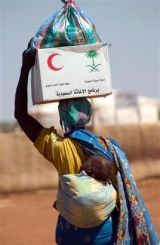Sudan govt ready to help UN investigators on genocide probe
By MOHAMED OSMAN, Associated Press Writer
KHARTOUM, Sudan, Nov 9, 2004 (AP) — Sudan said Tuesday it will cooperate fully with a United Nations team investigating genocide and human rights violation claims in the volatile Darfur region. Rebels and Sudanese authorities signed accords meant to end hostilities and guarantee aid access to more than 1.6 million people displaced by the 21-month conflict.

|
|
A displaced Sudanese woman carries her baby on her back and a box of aid provided by the Saudi Relief Agency Tuesday, Nov. 9, 2004, in el-Sereif refugee camp, on the outskirts of Nyala town in Sudan’s western Darfur region. (AP). |
The International Commission of Inquiry team arrived in the Sudanese capital, Khartoum, late Sunday on a mission to investigate reports of genocide and human rights violations in the three Darfur states, where a conflict has raged since rebels took up arms against government forces in February, 2003.
The commission was established in response to a U.N. Security Council resolution in September and is charged with identifying those guilty of human rights violations and making sure they are held accountable.
“We will provide all chances for the team to receive information from all sources it wants for reaching its conclusions and the government will deal with it with full transparency,” Foreign Minister Mustafa Osman Ismail told the official Sudan News Agency.
“(I hope) the U.N. team, a neutral body, will come out with the bare facts and this will help in refuting the huge bulk of allegations that have been propagated about the situation in Darfur,” Ismail added.
Sudan denies U.S. claims that there has been a genocide, but Ismail said his government “has never denied that there is a humanitarian, political and security problem in Darfur.”
In Nigeria, Sudanese authorities and Darfur rebels signed accords Tuesday meant to end hostilities and guarantee aid groups’ access to 1.6 million civilians uprooted by Darfur conflict.
Sudan agreed to create “no-fly zones” over Darfur, banning military flights over rebel-held territories. Rebels and African Union mediators had demanded the zones following widespread accusations of government bombings of villages.
Both sides agreed to allow aid groups free access to civilians, said Sudan’s No. 2 foreign affairs chief, Najib Abdel-Wahab, and Mahgoub Hussain of the rebel Sudan Liberation Army.
“It is really a historical moment,” Sudanese spokesman Ibrahim Mohammed Ibrahim said. “We will do our most to make sure it is implemented on the ground. Only that will bring peace and stability to Darfurians.”
The accords, however, came without any agreement on a political accord with long-term solutions to the crisis.
Sudan signed under international pressure, including threat of U.N. sanctions, after being accused of supporting Arab militia, known as the Janjaweed, in a campaign of violence against Darfur’s African villagers. Some 1.8 million people — most non-Arabs — have been driven by the conflict into camps in Darfur and neighboring Chad. The government denies backing the militia.
The accords on security and humanitarian access came in the third week of talks in Nigeria’s capital, after two previous rounds of African Union-brokered talks failed.
The United Nations has called Darfur the world’s worst humanitarian crisis, saying the conflict there has claimed 70,000 lives since March — mostly from disease and hunger — and now affects 2 million people, up from 1.8 million in September.
U.N. Secretary-General Kofi Annan said in a report to the Security Council last week there are strong indications that war crimes and crimes against humanity were committed “on a large and systematic scale” in Darfur.
The U.N. monitoring team, which met with several senior Sudanese officials, is expected to leave to Darfur on Wednesday and stay until Nov. 20, but it is not yet clear if it will travel to South Darfur state, where thousands of African villagers displaced by the conflict were kicked out of their camp, which was later bulldozed, last week and moved to another.
U.N. spokesman Fred Eckhard on Monday said the U.N. Mission in Sudan was being denied access to much of South Darfur and officials are concerned about the fate of those forcibly moved from El-Geer camp, near the city of Nyala.
A five-member Verification and Monitoring Team from the U.N.-linked International Organization for Migration has been meeting with displaced people and local authorities in Nyala regarding the El-Geer issue and is expected to release a report within several days on the movement of the refugees.
“The conditions of the movement were certainly of concern and this is what had prompted the (investigation) process,” IOM spokesman Louis Hoffmann told The Associated Press in Egypt.
The U.N. World Food Programme said rising Darfur insecurity cut its October food deliveries by nearly 10 percent compared to September.
“The main reason for the fall was insecurity spreading across Darfur, and escalating violence that is undermining WFP’s ability to operate effectively in a region of western Sudan as big as France,” the WFP said in a statement.
